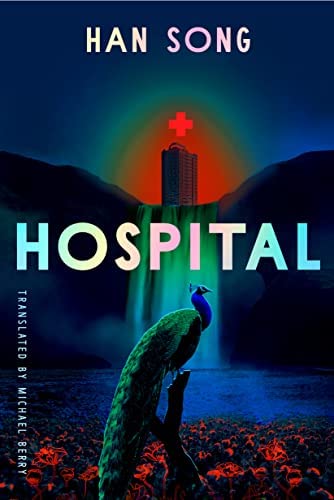
Michael Berry is joining us today to talk about his translation of the novel, HOSPITAL, by Han Song. Here’s the publisher’s description:
A twisted, wildly imaginative tale of one man’s mysterious illness and his journey through a dystopian hospital system.
When Yang Wei travels to C City for work, he expects nothing more than a standard business trip. A break from his day-to-day routine, a good paycheck, a nice hotel―nothing too extravagant, of course. No fuss, but all the amenities.
But this is where his problems begin. A complimentary bottle of mineral water from the hotel minibar results in sudden and debilitating stomach pain, followed by unconsciousness. When he wakes three days later, things don’t improve; they get worse. With no explanation, the hotel forcibly sends him to a hospital for examination. There, he receives no diagnosis, no discharge date…just a diligent guide to the labyrinthine medical system he’s now circulating through.
Armed with nothing but his own confusion, Yang Wei travels deeper into the inner workings of the hospital and the secrets it’s hiding from the patients. As he seeks escape and answers, one man’s illness takes him on a quest through a corrupt system and his own troubled mind.
What’s Michael’s favorite bit?

Michael Berry
A veritable “book of everything,” it is hard to pinpoint a favorite bit when it comes to Hospital. As a translator, I suppose what I enjoyed most was its feral nature. It is a novel that refuses to be tamed by literary conventions, the formulas of genre, or the expectations of the market. It is wild, in every sense of the word: its language, its imagination, its world-building, its structure, and its utter disregard of reader expectations. Whether it is the short prologue that doesn’t seem to have anything to do with the ensuing story (it actually links up to volume III of the trilogy), a “hero” whose name (Yang Wei) is a homophone for “impotence,” the satire and black humor that punctuates unnatural and disturbing scenes, or the narrative’s unexpected convulsions of nonsense and violence, Hospital insists on breaking molds and defying expectations. At times, it feels as if it was the product of fevered dream, a never-ending nightmare, or perhaps an AI algorithm gone haywire.
If I had to select one of my favorite passages, it might be this scene when Bai Dai, the protagonist’s sometime replicant love interest and fellow patient, takes him on a tour of the hospital garden. It is there in the garden that Yang Wei discovers an unforgettable and heart-stirring sight:
And then from the top of the inpatient tower, which appeared and disappeared from
behind the fog, I saw what looked like a massive green waterfall rushing down the side of the building. But it didn’t look like water. I asked Bai Dai, “What’s that?”
“Phlegm,” Bai Dai answered. “It’s all the phlegm the patients have coughed up.”
I stared at the waterfall in a state of disbelief. I really couldn’t imagine how all that thick, disgusting infected phlegm could transform into such a stunningly beautiful painterly vision—like something Van Gogh or Monet could have created! When matched with the red cross, the black-and-white flowers in the garden, and the dark rusty color of the birdcage, that green waterfall created a scene that was utterly intoxicating. No Hollywood special effects could ever replicate such unspeakable beauty. I couldn’t help but think of the Summer Palace back in the capital.
Without giving away too much of the plot, this is a scene that captures Han Song’s grotesque imagination, stunning imagery, and black humor. The last paragraph of the passage, featuring the protagonist’s laudatory first-person description of the “gorgeous scene” of the phlegm waterfall, also conjures (mocks) a certain style of Chinese nature writing often found in prose essays. The way in which the author is able to not only conjure up such wild and disturbing images but simultaneously inundate them with deadpan humor is a big part of what I love about Han Song’s writing. Of course, Hospital is also a book that invites allegorical interpretations, but also refuses to provide any clear-cut answers. I often think of it more as a novel that you need to bath in, to let the words flow over your body, a book to be experienced on a visceral level more than read on a cerebral level. In many ways, Hospital is less about story than it is about it scenes, images, descriptions, and mind games. It is a puzzle, a labyrinth, and ultimate dystopian nightmare. But peel away its outer shell and you may be surprised to find a reality lurking within that is uncomfortably close to home.
LINKS:
BIO:
Michael Berry is a professor of contemporary Chinese cultural studies and director of the Center for Chinese Studies at UCLA. He is the author of several books on Chinese film and culture, including Speaking in Images, A History of Pain, Jia Zhangke on Jia Zhangke and Translation, Disinformation and Wuhan Diary. He has served as a film consultant and a juror for numerous film festivals, including the Golden Horse (Taiwan) and the Fresh Wave (Hong Kong). He is also the translator of several novels, including To Live, The Song of Everlasting Sorrow (with Susan Chan Egan), and Remains of Life. His translation of Volume II of the Hospital Trilogy, Exorcism, will be published later this year.
